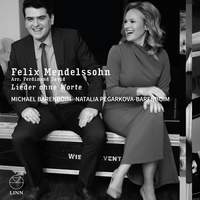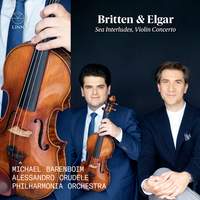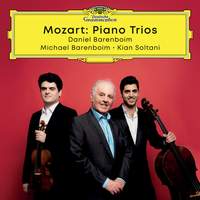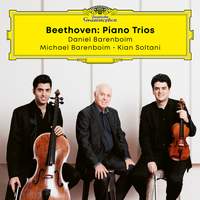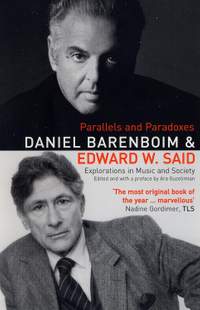Interview,
Michael Barenboim on Elgar and more
At the end of last year, I met up with Michael in Berlin (close to the headquarters of the Barenboim-Said Akademie, where he is now Dean) to discuss the institution's philosophy, the activities of the West-Eastern Divan Chamber Ensemble, his recent recording of the Elgar Violin Concerto - and how he's forged his own musical identity whilst having a 'once-in-a-century talent' as a parent...
Your family name comes up so often in discussions about the reception of Elgar's music in Europe...has he always been a special composer for you?
There’s so much in Elgar’s music that comes from the German Romantic tradition that I’m always surprised how people here don’t know it much more: of course Elgar occupies his own unique world, but those influences are so ingrained. The Cello Concerto is a bit of a special case and is performed quite often here, but everything else is still a bit underappreciated.
I’ve always been fascinated by the sound-world that Elgar creates: I’ve played the Violin Sonata and the Piano Quintet, and went to hear the orchestral music whenever I could. That all helped me to approach the Violin Concerto: you start to see idiomatic little gestures that are typical of his style, which is an important part of getting a handle on something so large and long! And especially in the last movement, the technical difficulty is really something - Elgar was a violinist, so he must’ve known what a challenge he was setting us!
Which violinists particularly inspired you in the piece?
I think it’s important to remember that he wrote the piece for Kreisler, who gave the premiere - but unfortunately he never recorded it, so we don’t know how he played it! If you look at certain details in the violin part you can tell that Elgar knows exactly who he’s writing for, and it helps as a violinist to imagine how Kreisler might have handled certain little twists and turns…If I could play it just like Kreisler then I would, but who can?!
Listening to a range of older recordings helped: it’s interesting to compare the first one with Albert Sammons and Henry Wood with Elgar’s own recording with Menuhin, because they’re so different. But my personal favourite is the one with Pinky [Pinchas Zukerman] and my dad: for my taste, that gives the clearest impression of what the piece should sound like, and it also helped me to approach it as a violinist. Pinky, as ever, sounds amazing - and so does the orchestra.
Tell me a little about your relationship with the West-Eastern Divan Orchestra and the Barenboim-Said Akademie...
I joined WEDO in 2001 when I was 14, and I became concertmaster in 2003/4. It makes me one of the longest-serving members, but there are still people who joined in 1999 when it was created. I think there’s this misconception that WEDO is a youth orchestra, but it isn’t: I’m 38, so if it was I’d have no business playing it!
The Barenboim-Said Akademie opened in 2016: I’ve been a professor there since 2017/18, and I became Dean in March 2020. Absolutely perfect timing...During the pandemic we were all working extremely hard (and within a constantly shifting framework) for very little result, but there was no choice: it was easier to do nothing, but it was wrong to do nothing. Now of course there’s a more creative side to the role, and lots of wonderful events are happening.
What's your recruitment-strategy at the Akademie?
We are a child of the Divan in the sense that our focus is on North Africa and the Middle East – around three-quarters of our students come from those areas. We have a strong communication with all our teachers out there; if someone with good potential from Egypt comes along we’re very likely to take that person. There was no need for another Musikhochschule in Berlin if we weren’t going to do something like this.
The audition process itself is very similar to other schools, with two particular differences. One is that we have a humanities component (philosophy, history, literature) and we also have an element of that in the audition: there’s a short interview with the panel, and they give a recommendation on that just as the instrumental teachers do. They look for students who are curious, willing to learn, and likely to be intellectually enriching for the institution – it’s not about whether they know a specific book by Plato! And that humanities component makes us special in Germany: at other Musikhochschulen you can take an elective if you want, but it’s at the heart of our curriculum.
Did you have much contact with the Akademie's co-founder, Edward Said?
When I started in WEDO he was already quite sick and couldn’t attend all the events we did, but I spoke with him on many occasions. He was a wonderful man: because I was so young I didn’t get the full measure of the vast intellectual curiosity and knowledge that you see when you read his work, but what really struck me was that he could talk about any subject with absolute expertise. I remember hearing him having an in-depth conversation about bullfighting, and thinking ‘Why do you know this? How do you know this?!’. These days we have a tendency to put public intellectuals into boxes of specialised knowledge, and this kind of intellectual doesn’t fit into a box: he sees the bigger picture, and understands why that picture is important.
I think that mindset is really what drew Edward and my dad together. Of course they got along on a personal level, but in essence it was an intellectual friendship between two people who believed that it’s not about knowing more about less: it’s about taking a wider perspective and understanding the connections between seemingly disparate things.
How did the WEDO Chamber Ensemble get off the ground?
Our inaugural tour was in late February/early March 2020: we went around the US and basically played the last concert of each series before the pandemic broke out! The next thing we did was a European tour in spring 2021: the Mendelssohn Octet, a Schubert Rondo for violin and strings, and a very strong new piece for string octet by a French-Lebanese composer called Benjamin Attahir. Then we went back to the US this February/March, with the Enescu Octet, Hindemith’s Trauermusik (where I played the viola), and a bit of Dvořák and Ravel.
For the November 2023 tour I wanted to incorporate some of the wonderful wind-players in the orchestra: the programme includes some very short pieces by Elliott Carter, which sprinkles some different colours into the mix! I met him briefly several times, and Dad conducted the premiere of his Cello Concerto for Yo-Yo Ma: he was such a prolific, versatile composer, and I think he’s especially brilliant as a miniaturist.
How long have you been playing the viola?
I’ve been doing it for six years - I play a lot of chamber music on the viola, and for most of my recitals I do something on the viola because it’s so enriching as a sound-colour. I love doing it in any case: there’s something very satisfying when it’s paired with the violin in a recital.
I always found switching between the two instruments played havoc with my intonation!
Somehow that never happens to me! When I started the viola, the first thing I did was to have some time away from the violin – I had no concerts for eight or nine weeks, so I spent six weeks just with the viola. It’s not just about getting the distance between the fingers right, it’s about how you produce the sound: bow-speed and weight, the vibrato, how flat you put the fingers etc.
Then the switching was not so complicated: I think a lot of the problem comes from people not taking it seriously and thinking it’s more or less the same as the violin: all those viola-jokes get ingrained in their brains, and they really start to believe that it’s easy! Of course if you just play it like the violin, it’s going to sound like a bad violin - but if you watch how real violists play you see the technical differences.
The person who introduced me to the viola was Gérard Caussé, who took me to a viola-maker called Charles Coquet who made the instrument I play now. You can’t copy Gérard’s playing any more than you can copy Kreisler’s, but I noticed that he does things that are specifically for the viola. And retrospectively I think it helped my violin playing because when you become conscious of certain things and you switch back, that has to be conscious too. For me that was very beneficial: I’m sure the Elgar recording would be less good if I didn’t play the viola!
Have you heard Timothy Ridout's wonderful new recording of the Elgar Cello Concerto as arranged by Lionel Tertis?
I haven’t, but now I guess I have to do that too! Which violist doesn’t dream of playing that piece? I feel like a violist would be more interested in that than playing something like the Dvořák concerto, although Dvořák also has a very strong relationship with the instrument: you’re always guaranteed an interesting viola-part in his chamber and orchestral music!
Leaving family aside for a moment, which musicians have had the biggest impact on your approach to making music?
When I joined WEDO the first-violin coach was Axel Wilczok, one of the concertmasters of the Staatskapelle Berlin; he became my long-term teacher until I finished my studies. Axel was a very important person in my life, and unfortunately he passed away recently at just 66; he was a very inspiring presence for the first violinists of WEDO because he was so warm and encouraging…And when things DID go wrong he always recognised that supporting someone is more important than putting them down. Confidence is so important in this business, and only musicians care about wrong notes – everyone else cares about sharing an artistic moment.
We were talking about Kreisler earlier, and I’ve heard nearly all of his recordings – there isn’t one of them which doesn’t include a wrong note somewhere, and it’s still some of the best stuff around! Likewise Heifetz, who was extremely technically on top of things: little things still go wrong, but people didn’t really mind. Perhaps it’s partly because they didn’t really have the chance to redo things in the studio like we do today: they’d just put the needle on the thing and say GO! Doors slamming, people coughing…warts and all! Twenty or thirty years ago was when things started to change.
It sounds like you approach recording in the spirit of live performance?
My principal in the studio is that I never listen back whilst I’m recording. You have to stay in artistic mode, because it’s so easy to slip into the mindset of doing twenty-five takes of a few bars, and that’s not creative – I’ve never understood that. I let the engineers do their job while I do mine: we can talk about it afterwards, when I’m in listener-mode.
My dad approaches recordings in live-performance mode too: when we recorded those Mozart and Beethoven trios together with Kian [Soltani], we’d just play the entire thing and ask if anybody wanted to fix anything. If there’s a patch, fair enough, but just fix the patch: don’t spend the rest of the day trying to get that G sharp in exactly the right place!
A little while ago, I spoke to a young countertenor who initially shied away from pursuing a career in music because his father (also a countertenor) is such a towering figure - did you ever experience similar anxieties?
I get the general gist, and I do sympathise. I have it slightly easier because I’m in the same field but not doing the same thing, so there’s no practical point of comparison: I play the violin way better than Dad does! (Alright, I suppose he does have the edge when it comes to the piano…).
Of course if people really want to compare me to my dad, I’ll probably lose out - he’s a once-in-a-century talent, so by definition nobody can expect that from me too! I think I have my own qualities and things to offer as a musician, and I’ve always just tried to do that to the best of my ability. There are so many wonderful violinists out there, and ultimately I don’t think I feel any more pressure than all those other people.
When you go into the same field as your parents there are various things to negotiate. There’s the question of how you enter into the profession with your own voice and creativity, but there’s a more difficult question: how do I keep the relationship with my parent as a personal one rather than something primarily professional? At the end of the day you want your dad to be your dad, not a business-partner, and I think we’ve navigated that pretty well!
I gather your next recording for Linn is going to be a family affair in a different sense?
Yes, that’s coming in March: my wife Natalia and I have recorded Ferdinand David’s arrangements of some of the Mendelssohn Songs Without Words. They’re a great, competent label who really know the music – they genuinely care about the product that they put out, and that’s so important.
Michael Barenboim (violin), Natalia Pegarkova-Barenboim (piano)
Available Formats: CD, MP3, FLAC, Hi-Res FLAC
Michael Barenboim (violin), Philharmonia Orchestra, Alessandro Crudele
Available Formats: CD, MP3, FLAC, Hi-Res FLAC
Daniel Barenboim (piano), Michael Barenboim (violin), Kian Soltani (cello)
Available Formats: 2 CDs, MP3, FLAC, Hi-Res FLAC
Daniel Barenboim (piano), Kian Soltani (cello), Michael Barenboim (violin)
Available Formats: MP3, FLAC, Hi-Res FLAC
Daniel Barenboim & Edward W. Said
Available Format: Book



